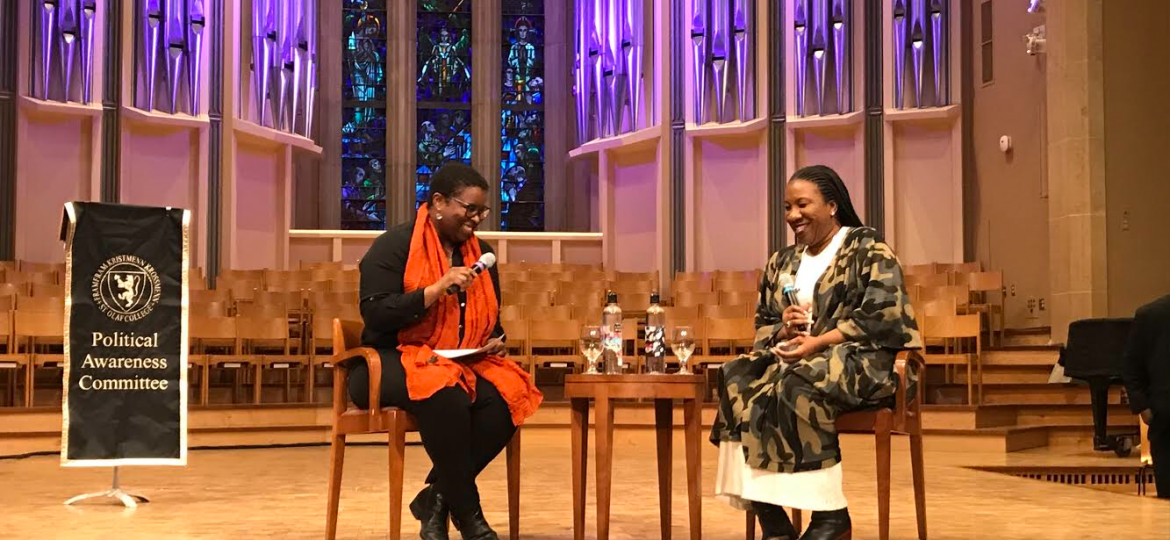
St. Olaf College’s Political Awareness Committee (PAC) had the pleasure of hosting activist Tarana Burke in Boe Memorial Chapel.
Burke is the founder of the Me Too movement, a movement that works to expose gender-based violence across the world. She is also the current director at Girls for Gender Equity in Brooklyn, New York and the co-founder of Just Be, Inc. Both organizations work to create safe spaces and opportunities for young women.
From a young age, Burke has been involved in social justice issues, but she didn’t get into gender-based violence work until later in her life. As a survivor herself, Burke said, “there is healing in acting.” Even though the work she does is tough, Burke believes that “if there is just one little girl who doesn’t have to feel what I did, then this was a success.”
Burke emphasized the importance of elevating women of color in this movement. Burke said that if we focus on the most marginalized of us all, everyone will benefit. She acknowledged that many people are affected by this violence from all backgrounds, but what differentiates groups is how society responds to this violence.
“We understand sexual violence doesn’t discriminate, it’s the responses to gender-based violence where we discriminate,” Burke said.
As an example of this problem, Burke compared the Weinstein and R. Kelly cases. Because Weinstein’s victims were high profile white women, the world responded much quicker than in the case of R. Kelly, who victimized many women, mostly nonwhite, under the public eye without a reaction for years.
“We are socialized to respond to the vulnerability of white women,” Burke said.
Burke emphasized the importance of treating every group’s experiences with gender-based violence differently because of the unique circumstances surrounding individual situations. Along with this important separation, she said it is very important to qualify all survival experiences. She reminded people that some stories are messy and complex. Trauma affects each person in unique ways and that should be more widely understood.
Burke discussed the complications that come with reporting on sexual violence and retraumatization. Survivors shouldn’t need to relay all the gory details of their experience. It’s unfair that “we need to cut and bleed for people to have empathy,” Burke said. “Me too can be a conversation starter or the whole conversation.”
Understanding that survivors don’t owe anyone a rational unified story, or even one at all, is important to remember.
According to Burke, colleges including St. Olaf can and should be doing better to deal with sexual violence. Burke also said that President David Anderson ’74 needs to be consistently clear that St. Olaf has a zero-tolerance policy for sexual violence. Furthermore, she said that college students should be safe and should feel empowered to demand that safety. This safety should become a culture on campus that we can consistently rely on.
She brought up the example of Rutgers University which requires a mandatory seminar every year for students instead of just an online session as a way to create that culture of safety. The school should also be more transparent about its past failures and what they are consistently doing to improve. Title IX, according to Burke, should be completely overhauled, as it is not doing nearly enough.
“When I walk around campus students should make me feel like they are safe,” Burke said.
Along with making sure that students are safe and “don’t leave the school more broken than they came,” the institution has a duty to reprimand perpetrators so as to prevent them from harming more people, Burke said. Burke believes that we must, however, move away from a system of crime and punishment and move towards a more restorative and transformative process for the perpetrators.
Burke reminded supporters of the movement that survivors need empathy and not pity. Survivors need to continuously live with what happened to them and “commit to healing work,” Burke said, and “remember that there is strength in survival.”

